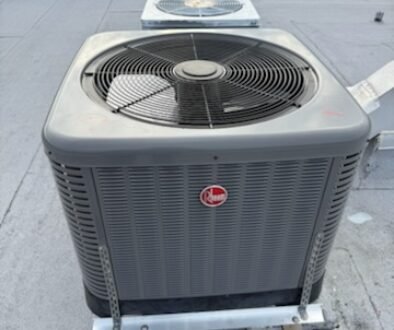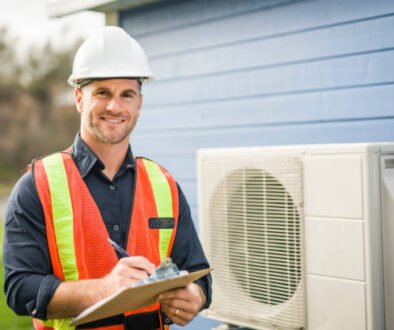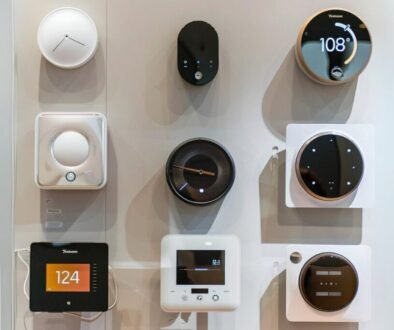The Different Types of HVAC Systems in the US

Published December 6, 2023
When it comes to keeping our homes and businesses comfortable, HVAC systems play a crucial role. But what exactly is HVAC, and how does it work?
In this article, we will explore the different types of HVAC systems in the US. We will help you determine which system is best suited for your needs.
Types of HVAC systems in the US
Split Systems
Split systems are the most common HVAC system in residential buildings. They consist of an outdoor unit, known as the condenser/compressor, and an indoor unit containing the evaporator coil and blower. Split systems provide both heating and cooling capabilities.
There are three main types of split HVAC systems:
- Single-Zone
This system has one indoor unit connected to one outdoor unit, providing heating and cooling to a single area or room.
- Multi-Zone
This system connects multiple indoor units to one outdoor unit, allowing for individual temperature control in various zones or rooms.
- Variable Refrigerant Flow (VRF)
This advanced system can provide heating and cooling simultaneously to different areas, using a single outdoor unit and multiple indoor units with varying capacities.
Pros of Split Systems:
- Energy Efficiency
- Zone Control
- Quiet Operation
- Easy Installation
- Improved Indoor Air Quality
Cons of Split Systems:
- Higher Initial Cost
- Requires Professional Installation
- Limited Cooling Capacity
- Aesthetics
- Regular Maintenance
Packaged Systems
Packaged systems are often used in commercial buildings where space is limited. These systems contain all the components. They include a compressor, evaporator coil, and condenser in a single unit. These systems are typically installed on the roof or outside the building.
Pros of Packaged Systems:
- Compact Design
- Convenient Installation
- Efficient Use of Space
- Simplified Maintenance
- Suitable for Commercial Buildings
Cons of Packaged Systems:
- Limited Customization Options
- Potential Noise Generation
- Difficult Access for Maintenance
- Higher Initial Cost
- May Need Rooftop Installation
Ductless Mini-Split Systems
Ductless mini-split systems are a popular choice for homes without existing ductwork. They consist of an outdoor unit and one or more indoor units connected by refrigerant lines. Ductless mini-splits allow for zoned heating and cooling. They provide greater control and energy efficiency.
Pros of Ductless Mini-Split Systems:
- Easy Installation
- Flexible Zoning Options
- Energy Efficiency
- Improved Indoor Air Quality
- Quiet Operation
Cons of Ductless Mini-Split Systems:
- Higher Initial Cost
- Requires Professional Installation
- Potential Aesthetic Impact
- Limited Cooling Capacity for Larger Spaces
- Regular Maintenance Required
Geothermal Heat Pump Systems
Geothermal heat pump systems use the natural heat stored in the ground. They provide heating, cooling, and hot water. These systems are highly efficient and environmentally friendly. But they need a significant upfront investment.
Pros of Geothermal Heat Pump Systems:
- High Energy Efficiency
- Environmentally Friendly
- Consistent Temperature Control
- Long Lifespan
- Low Operating Costs
Cons of Geothermal Heat Pump Systems:
- High Initial Cost
- Requires Adequate Land or Drilling
- Complex Installation Process
- Limited Availability in Some Areas
- Regular Maintenance Required

Frequently Asked Questions (FAQs)
How can I tell what type of HVAC system I have?
You can read the documentation provided with your AC unit, inspect the outdoor unit for heat pump or conventional system features, or locate the manufacturer’s label on the outdoor unit to identify the make, model, size, and age. Another option is to consult HVAC professionals or online resources for guidance.
What is the most common HVAC system?
The most common HVAC system is the split system, which includes an indoor unit (evaporator coil and blower) and an outdoor unit (condenser). This system is widely used in residential settings for heating and cooling.
Which HVAC system lasts the longest?
The HVAC system that is known to last the longest is the geothermal system. With proper maintenance, these systems can have a lifespan of up to 25 years or more.
What is the most expensive HVAC system?
The most expensive HVAC system is the geothermal heat pump, with prices ranging from $13,530 to $36,530. This system utilizes the earth’s natural heat for heating and cooling, providing energy efficiency and long-term savings.
Which HVAC system is best for you?
Choosing the right HVAC system depends on various factors. This includes the size of your space, your budget, and your specific heating and cooling needs. It is advisable to consult with a professional HVAC technician who can assess your requirements. They can recommend the most suitable system for your property.
Investing in the right HVAC system can enhance your comfort, whether you opt for a split system, packaged system, ductless mini-split, or geothermal heat pump. It can improve energy efficiency and contribute to a healthier living or working environment.

This Content Is Fact Checked
This content has undergone thorough fact-checking by our team of internal experts. Gain further insight into the editorial standards upheld on our website here.
South Florida HVAC Professionals
Snowflakes Air Conditioning has been providing professional HVAC services for over 10 years. We are committed to keeping your air conditioner running smoothly all year round. Our experienced technicians can handle anything from AC repair to sales and AC installation. Whether it’s time for an upgrade or just regular upkeep, we are a name you can trust for your HVAC needs. Contact us today for more information.

About The Author
Meet writer Rei Bayucca, an HVAC and construction industry enthusiast. Discover insightful articles designed to help you solve your most pressing problems. Rei can captivate you with expertly crafted content that will leave you hungry for more.



